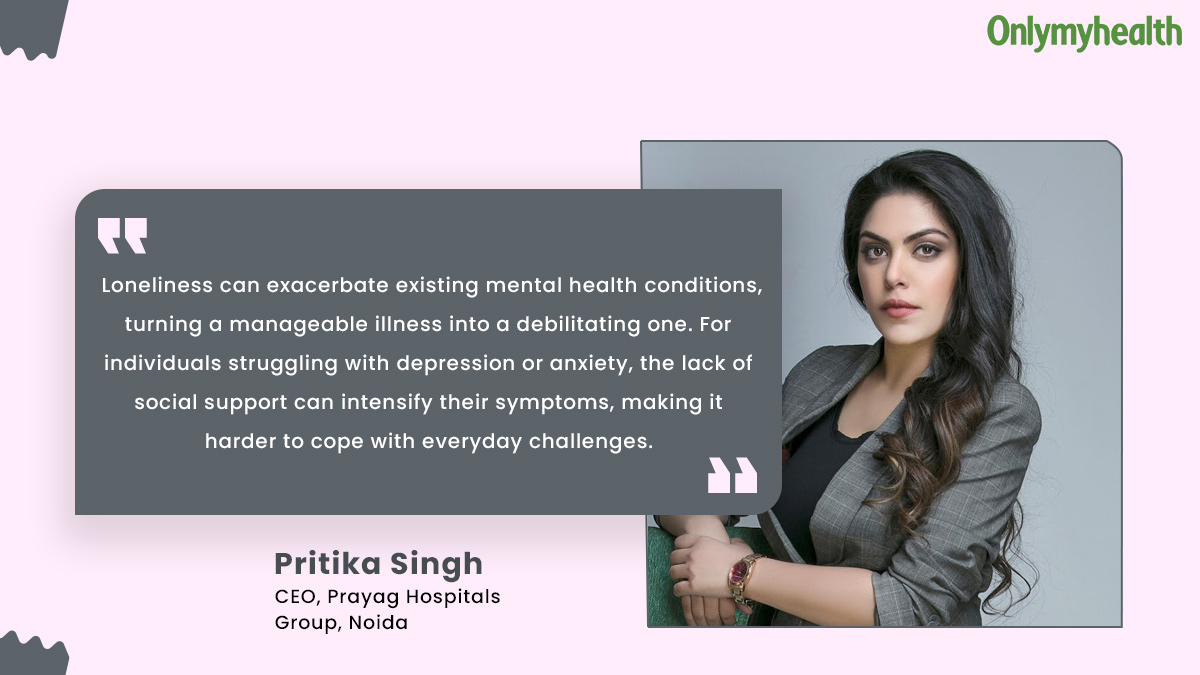In today's world, people have numerous social media platforms and digital communication avenues available to them. However, despite all these resources, many individuals still feel lonely and isolated. This feeling of loneliness not only affects our emotions but also has a significant impact on our mental health. It can alter our mood and cognitive functions, and take a toll on our overall well-being. This week in our 'Mental Health Matters' series, we spoke to Pritika Singh, CEO, Prayag Hospitals Group, Noida, who explained the impact of loneliness on mental health.
Impact Of Loneliness On Mental Health

“Loneliness is not merely the absence of company; it's a profound sense of disconnection from others, a feeling of being misunderstood or unloved, even in a crowded room. Its effects on mental health are far-reaching and profound”, said Singh.
According to HHS Public Access, as many as 80% of people under the age of 18 and 40% of adults over 65 report feeling lonely at least occasionally. The prevalence of loneliness decreases with middle adulthood and then rises with advanced age.
The Neurological Response

Singh said, “When one lacks meaningful social connections, the brain responds by ramping up stress levels, triggering the release of cortisol, the body's primary stress hormone. Over time, this chronic stress can wreak havoc on both our physical and mental health, contributing to health problems ranging from heart disease to cognitive decline.”
Also Read: Mental Health Matters: Expert Explains Maternal Gatekeeping And Mitigating Feelings Of Isolation
Cognitive Impairment

Loneliness doesn't just affect our emotional well-being; it also impairs our cognitive functions. Lonely individuals often exhibit deficits in attention, memory, and decision-making abilities. “The constant rumination and negative self-talk that accompany loneliness can hijack our thoughts, making it difficult to concentrate on tasks or make rational judgments”, added Singh.
According to the Journal of Clinical And Diagnostic Research, depression, alcoholism, child maltreatment, sleep issues, personality disorders, and Alzheimer's disease are some of the mental illnesses that can be brought on by loneliness.
“Moreover, loneliness has been linked to an increased risk of developing Alzheimer's disease and other forms of dementia, highlighting the profound impact of social isolation on cognitive health”, said Singh.
Exacerbating Existing Conditions
Furthermore, loneliness can exacerbate existing mental health conditions, turning a manageable illness into a debilitating one. For individuals struggling with depression or anxiety, the lack of social support can intensify their symptoms, making it harder to cope with everyday challenges. Without a supportive network of friends and family, individuals may feel trapped in a downward spiral of despair, unable to see a way out of their suffering.

Also Read: Mental Health Matters: From Self-Doubt To Feeling Like A Fraud, Expert Explains Imposter Syndrome
Loneliness Amidst the Pandemic
The COVID-19 pandemic has cast a harsh spotlight on the issue of loneliness, as lockdowns and social distancing measures have left many people feeling more isolated than ever before.
Singh said, “The sudden disruption of social routines and the loss of physical contact with loved ones have taken a toll on mental health worldwide, leading to a surge in cases of depression and anxiety. As we navigate the uncertainties of this new normal, it's essential to recognise the importance of social connections in safeguarding our mental well-being.”
How To Cope-Up With Loneliness

Addressing loneliness requires a multifaceted approach that encompasses both individual and societal interventions.
“On an individual level, cultivating meaningful relationships and nurturing social connections can help ward off feelings of loneliness. This may involve reaching out to friends or family members, joining clubs or community groups, or volunteering for a cause you care about”, added Singh. Also, practising self-care and engaging in activities that bring you joy can help bolster your resilience against loneliness.
“At the societal level, we must work to create environments that foster social inclusion and belonging. This means investing in community resources and support services that provide individuals with the tools they need to connect with others”, said Singh. It also means challenging the stigma surrounding loneliness and mental illness, so that people feel comfortable seeking help when they need it. By prioritising mental health and social well-being, we can build a more compassionate and resilient society for all.
Bottomline
Singh concluded, “Loneliness, no doubt, is a pervasive and insidious threat to our mental health, with far-reaching consequences for individuals and society as a whole. As we grapple with the challenges of modern life, it's essential to recognise the importance of social connections in safeguarding our well-being.”
[Disclaimer: The information in this article is shared by an expert and is for informational purposes only. Hence, we advise you to consult your mental health expert if you face any issues for proper diagnosis and treatment.]